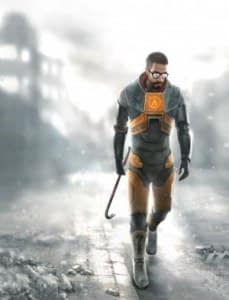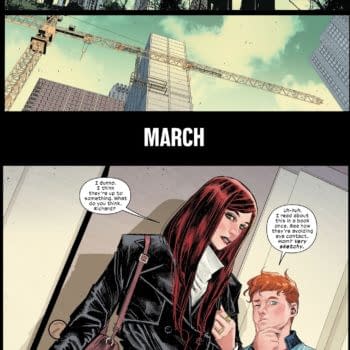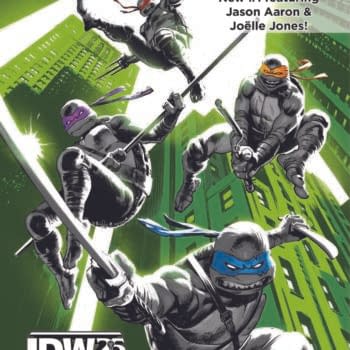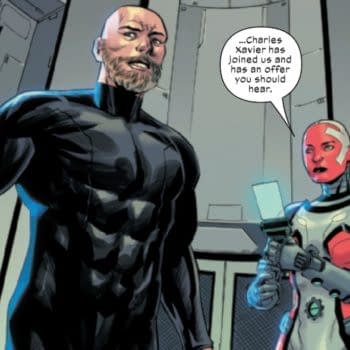Posted in: Look! It Moves! by Adi Tantimedh, Recent Updates | Tagged:
Look! It Moves! by Adi Tantimedh #18 – The Wit And Wisdom Of Dr Gordon Freeman
I've been looking at First Person Shooter games lately, and thinking about the stories and characters the makers script behind them. At the end of the day, a FPS is a computer program where shooting and dodging at targets you're clicking on reactive areas on the screen and polygons before they reset your program. That's the form, but it's the content that interests me, and which forms the basis for whether a game is successful or not. Do you play as a Cyborg Space Marine fighting alien armies (HALO), a time traveling soldier fighting armies in past history (DARKEST OF DAYS), an SAS soldier fighting Russian nationalists (CALL OF DUTY 4: MODERN WARFARE), or a scientist forced to an alien invasion and their human allies (HALF-LIFE). How well an FPS game sells seems predicated on how well-designed the gameplay controls are and how well-written the story is these days, as gamers seem to demand a lot more than just pointing and shooting now. Dull gameplay and a sloppy story seems to explain why DARKEST OF DAYS seems to be bombing.
But the bottom line of a shooter game is still about playing the hero who shoots and kills the enemy, so the story could be surprisingly deep and detailed, as in HALO and HALF-LIFE, but the hero can't come overly burdened with detail and baggage. First Person Shooters aren't like Role-Playing Games, the latter of which Is based on the player creating and customizing the hero or heroine to personalize the experience, and then make different branching interactive decisions that determine the course of the story. First Person Shooters don't have alternate branches to where the story goes. That's not their function. The narrative of a First Person Shooter always goes one way, and the hero has to move and shoot his way to that conclusion. Thus, the player character in an FPS is often a tabula rasa for the player to invest his own emotions into. That seems to be why Master Chief in HALO never reveals his face, even though he has a very specific and tragic backstory that was revealed in tie-in novels that have been New York Times Bestsellers. Player or fan immersion in the characters and the world seems to be the key to success in video games, which is the same for success in movies, TV shows, comics and books.

 Machinima animator Ross Scott has done something interesting with the original HALF-LIFE game. Where other fans and animators create entirely new material and stories with Valve's game machines and characters, Scott decided to create a series by faithfully depicting the original game from beginning to end, only he gives Freeman a voice to his inner thoughts. The result is FREEMAN'S MIND, an existential Science Fiction sitcom.
Machinima animator Ross Scott has done something interesting with the original HALF-LIFE game. Where other fans and animators create entirely new material and stories with Valve's game machines and characters, Scott decided to create a series by faithfully depicting the original game from beginning to end, only he gives Freeman a voice to his inner thoughts. The result is FREEMAN'S MIND, an existential Science Fiction sitcom.
Now that Freeman has been given a voice and a personality, he's bored and neurotic with moments of delusion, paranoia and meglomania. He doesn't much like his co-workers and finds a lot of evidence that he's smarter than everyone there. Kind of like most of us, really. If anything, FREEMAN'S MIND reveals that even when you work for a top secret governmental science project that might bring about the end of the world, the day-to-day grind of work is as dreary as ever. As he heads into work for what's going to become a Really Bad Day, you get the feeling that if all hell hadn't broken loose and he gets to take out his frustrations and resentments on the aliens and soldiers, he might one day snap and go postal. Instead of becoming a homicidal lunatic, he ends up an action hero. If this were a movie, it would be the ultimate experimental first-person POV Science Fiction movie with a massive budget. As a webseries, it's inexpensive and broken down in 10-minute installments, which is the perfect length for a serial with escalating complications.
"I'm a physics-crunching bad-ass!" declares Freeman in surprise and delight as he fights his way through yet another level of insane, dangerous peril. He seems to have found his true calling as the running, shooting, crowbar-swinging Indiana Jones of the Quantum Physics world. He stops to make himself a cup of coffee at a refreshments station in a break from the carnage. "Better than crystal meth, and not as bad on the teeth." He pauses to eat some Cheetos from a vending machine, finds they taste funny and considers writing a letter of complaint to the company to tell them, "That, and we're being attacked by aliens."
To Freeman, it's like the shit that goes down at the Black Mesa lab on everyone's Worst Day Ever isn't a complete surprise to him. Rather than panic like everyone else, he's merely nonplussed. Instead of waiting for the authorities to send help like his co-workers (a decision they will live to regret), he decides to try to escape on his own. Things of course go from bad to worse, as anyone who's ever played the game would know, and Freeman provides increasingly exasperated Captain Sensible commentary on the proceedings as he sees the increasing absurdity of the building's maze-like structure and increasing number of entities and people trying to kill him. And yet he never gives up or despairs because he really is smarter and probably crazier than everyone else around and he's not going to lie down and take it. With his stream of consciousness narration, the game's story is revealed as the ultimate existential metaphor: your job sucks, you're told to do something that causes the shit to hit the fan and then the entire universe is out to get you. Who hasn't felt like that on a Monday morning? It's like the final missing layer has been added to the game, and a testament to the richness of the writing already in the game that enabled Scott to find it, and also a prime example of what people do with fiction beyond just passively consuming it. That's the kind of deeply-built fiction we crave.
FREEMAN'S MIND can be viewed on Youtube and downloaded from Machinima's website, linked from Ross Scott's website Accursed Farms, all for free.
© Copyright Adisakdi Tantimedh











